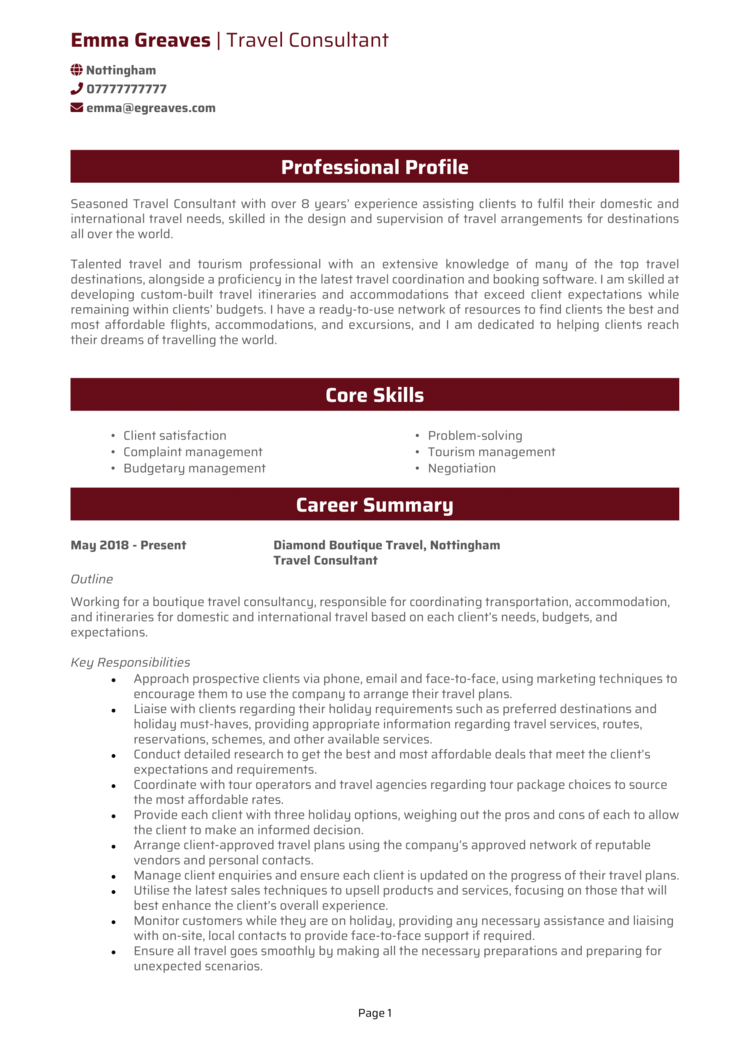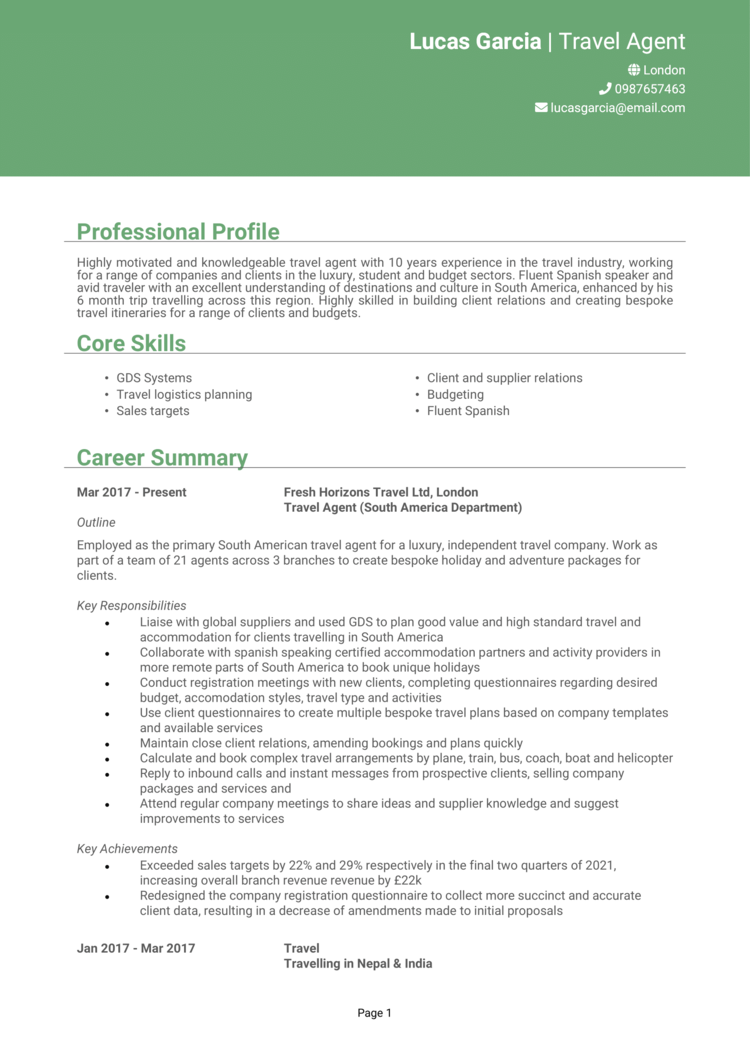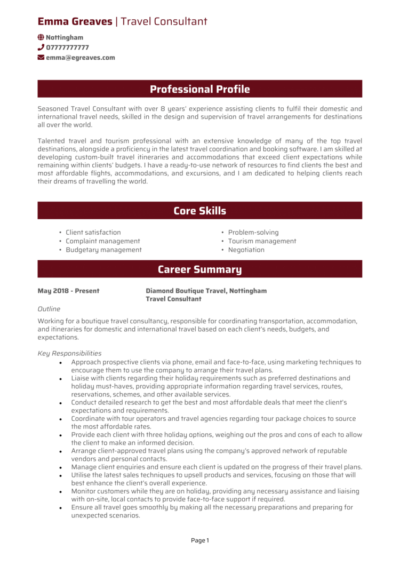You’re great at planning dream holidays – but now it’s time to book your own next destination: a better job.
Whether you specialise in luxury getaways or quick city breaks, one thing’s for sure – no one’s going to hand you that job unless your CV’s as polished as your itineraries.
This guide, complete with 2 Travel Consultant CV examples, will show you how to present your experience and strengths, and tailor your CV to match exactly what travel agencies and tour operators are looking for.
Travel Consultant CV example

Travel Agent CV example

How to write your Travel Consultant CV
Discover how to craft a winning Travel Consultant CV that lands interviews with this simple step-by-step guide.
This guide will walk you through every part of writing a CV. From formatting your experience to showcasing your destination knowledge, upselling abilities, and system skills, it covers everything you need to build a job-winning application.
Whether you’re in retail travel, corporate bookings, or luxury holiday planning, this guide will help you highlight your best assets – and get you one step closer to your next role.
The best way to structure and format your Travel Consultant CV


You wouldn’t hand a client a jumbled itinerary – so don’t send a recruiter a messy CV. A well-organised layout helps employers instantly spot your qualifications and experience without having to dig through a confusing wall of text and visual mistakes. Following the below tips will give recruiters the easiest time reading your application.
Here’s the structure to follow:
- Name and contact details – Start with your name and personal information – make it simple for recruiters to reach you. Including a photo is a personal choice.
- Profile – Use this section to summarise your experience, strengths, and what makes you a standout candidate.
- Core skills – Outline your primary competencies to give recruiters a snapshot of your strengths.
- Work experience – Walk through your professional experience, beginning with your latest position and moving backwards.
- Education – Outline your education and certifications, focusing on those most relevant to the role.
- Additional info – This section is optional, but it’s a good place for hobbies that complement your CV.
Keep the CV to a maximum length of two pages, and make sure each section is clearly labelled with bold headings so it’s easy to navigate. Use bullet points to break down your responsibilities under each role. Stick to a clean, professional font and make sure your layout is tidy and spaced out – your CV format should feel as smooth and easy to follow as a well-planned trip.
What is a Travel Consultant CV profile?


Your CV profile is the first thing recruiters will read – so make sure it shows you’re not just good with bookings, but just as brilliant with people.
This short paragraph should highlight your sales ability, product knowledge, and the way you create memorable travel experiences that keep customers coming back. You’ll need to convey to recruiters that you would bring genuine value to whichever company takes you on board.
Travel Consultant CV profile examples
Profile 1
Experienced Travel Consultant with over 10 years of experience in leisure and business travel services. Skilled in creating bespoke holiday packages, managing bookings, and advising clients on destinations, visas, and insurance. Proficient in using Galileo and Amadeus systems and known for delivering outstanding customer service in fast-paced environments.
Profile 2
Knowledgeable Travel Consultant with seven years of experience working for a global travel agency, specialising in luxury holidays, cruise bookings, and tailor-made itineraries. Adept at coordinating multi-stop journeys, handling last-minute changes, and building loyal client relationships through expert destination knowledge and personal service.
Profile 3
Client-focused Travel Consultant with five years of experience assisting customers with domestic and international travel planning. Strong background in air, rail, and accommodation bookings, with excellent attention to detail and the ability to suggest cost-effective options. Confident using GDS software and resolving travel disruptions quickly.
Details to put in your Travel Consultant CV profile
Make sure your profile considers the following:
- Where you worked – You may have worked in high-street travel agencies, online booking platforms, or bespoke tour operators, helping a wide range of clients plan trips across the globe.
- Your top qualifications – You might hold a Level 3 Certificate in Travel Services or equivalent, plus in-house sales or GDS training depending on the company.
- Essential skills – You likely bring experience in itinerary planning, upselling travel extras, handling bookings and amendments, and using booking platforms like Amadeus or Galileo.
- Types of customers served – You could have worked with solo travellers, families, corporate clients, or large groups — each with their own needs and budgets.
- Value delivered – In previous roles, you may have exceeded monthly sales targets, received excellent customer feedback, or developed loyal repeat business through great service.
How to highlight your core skills


The core skills section should act like a brief snapshot of your key strengths as a travel consultant, each one tailored to the jobs you’re applying for.
Highlight your knowledge of destinations, booking systems, and customer service skills while keeping the tone natural and conversational. The aim is to give the recruiter a fast overview of what you bring to the table without sounding like a checklist – just a confident statement of your abilities and approach to the role.
Essential skills for a Travel Consultant CV
- Itinerary Planning and Customisation – Designing tailored travel plans based on client preferences, budgets, and interests.
- Booking and Reservation Management – Coordinating flights, hotels, car rentals, tours, and other services through booking platforms and suppliers.
- Destination Knowledge and Recommendations – Advising clients on destinations, attractions, cultural experiences, and travel requirements.
- Visa and Travel Documentation Assistance – Guiding clients through visa applications, passport requirements, and travel insurance options.
- Fare and Package Comparison – Researching and comparing travel deals to provide the best value while meeting client needs.
- Travel Software and GDS Proficiency – Using global distribution systems (e.g., Amadeus, Sabre) and CRM tools to manage bookings efficiently.
- Crisis and Change Management – Handling cancellations, delays, or emergencies by rearranging bookings and supporting clients in transit.
- Sales and Upselling Techniques – Promoting travel upgrades, insurance, or add-on experiences to maximise booking value and client satisfaction.
- Budgeting and Cost Estimation – Preparing accurate travel quotes, managing client budgets, and ensuring transparency in pricing.
- Customer Relationship Building – Maintaining strong client relationships through follow-ups, loyalty programmes, and personalised service.
How to showcase your work experience in your CV


This section shows how you’ve helped clients find their perfect trip – and how you’ve helped employers hit targets along the way. List your work experience in reverse chronological order.
If you’re early in your career, you can still include work placements, internships, or relevant customer-facing roles to show transferable skills. From handling enquiries and selling package holidays to managing complaints and building repeat business, each role should show your contribution and achievements clearly and professionally.
How to format previous jobs in your CV correctly

- Outline – Start by introducing the company, what type of travel services they offer, and your role in the team. Mention whether you worked in a retail branch, call centre, or independent agency.
- Responsibilities – Explain your key duties using action words like “arranged” and “advised.” For example: “arranged bespoke holiday packages for families and honeymooners” or “advised clients on travel regulations, insurance, and visa requirements.” Be sure to mention any booking systems or platforms you used.
- Achievements – Show the value you brought to the business – whether that’s consistently exceeding sales targets, generating repeat bookings, or receiving customer commendations. Add figures where you can, like monthly revenue or upselling rates.
Example work history for Travel Consultants
Travel Consultant | Vista World Travel Ltd
Outline
Managed holiday planning and bookings for a busy high-street travel agency, specialising in package holidays, cruises, and tailor-made tours for families and couples.
Responsibilities
- Advised clients on destinations, travel insurance, and entry requirements
- Used Galileo to book flights, accommodation, car hire, and excursions
- Built personalised itineraries based on budget, travel preferences, and timelines
- Processed payments and managed customer documents including tickets and visas
- Handled changes, cancellations, and emergency requests with professionalism
Achievements
- Achieved highest quarterly sales in 2023 across regional branch network
- Maintained 96% client satisfaction score through regular feedback surveys
- Generated over £250k in repeat bookings through exceptional customer care
Travel Consultant | Sapphire Getaways
Outline
Worked for a boutique travel agency focused on luxury travel experiences, honeymoons, and bespoke itineraries to Europe, Asia, and the Caribbean.
Responsibilities
- Met with clients to understand preferences and designed custom travel plans
- Recommended luxury hotels, unique excursions, and insider destination tips
- Built supplier relationships to negotiate added-value extras for clients
- Managed bookings end-to-end, including invoicing and documentation
- Stayed informed on travel trends, safety updates, and seasonal offers
Achievements
- Secured 35% of all honeymoon bookings through word-of-mouth referrals
- Created sample itinerary templates that boosted enquiry-to-booking rates
- Earned ‘Top Consultant’ award for exceeding quarterly sales targets
Travel Consultant | Azure Corporate Travel
Outline
Organised business travel for clients across legal, finance, and tech sectors, supporting busy professionals with seamless travel arrangements for domestic and international trips.
Responsibilities
- Booked flights, hotels, and transfers for individuals and teams across multiple time zones
- Handled visa applications and provided travel risk updates to clients
- Responded to urgent changes, delays, or cancellations with alternative options
- Managed accounts and billing for corporate travel budgets
- Liaised with airlines and hotels to secure upgrades and resolve issues
Achievements
- Reduced client travel spend by 18% by identifying better supplier rates and schedules
- Recognised for 100% accuracy on itineraries across three consecutive quarters
- Trained two new consultants on GDS use and internal booking protocols
Structuring your education section


The education section of your CV should reflect any formal qualifications and training you’ve completed, especially those related to tourism, sales, or customer service.
Start with your most recent or relevant qualifications and work backwards. If you studied travel and tourism at college or university, mention it alongside any specialist travel consultant training or certification. You can also include short courses in systems like Galileo or Amadeus if relevant.
Keep this section short and clearly structured with bullet points to break up dense information.
Top qualifications to showcase on a Travel Consultant CV
- Level 3 Diploma in Travel and Tourism – A widely recognised college qualification for entry into the travel industry.
- ABTA or ATOL-recognised training – Demonstrates understanding of consumer protection and industry compliance.
- Certificate in Travel Services (City & Guilds) – A practical foundation in bookings, customer service, and product knowledge.
- Training in GDS platforms (e.g. Amadeus, Galileo, Sabre) – Essential for consultants in corporate or international travel.
- Customer Service or Sales NVQs – Valuable for proving customer-facing or target-driven experience.





